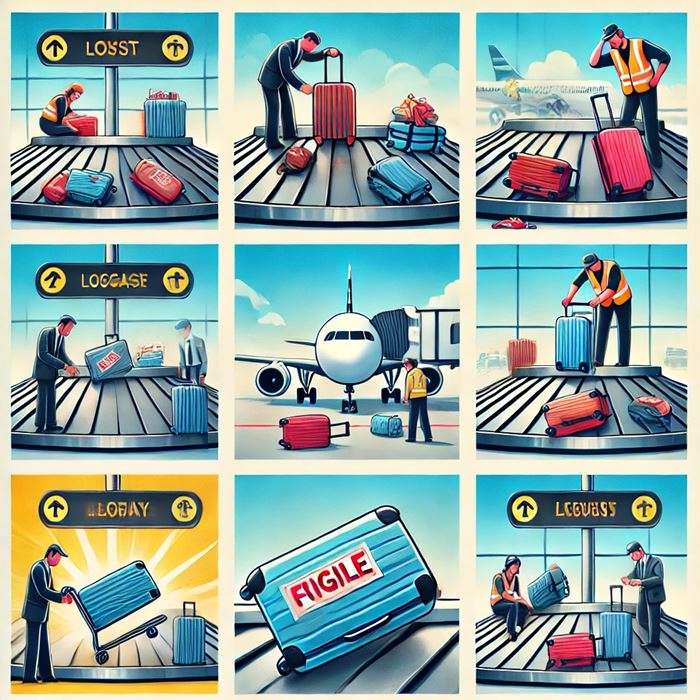Common Problems Experienced by Airline Passengers: Service Quality Issues and Solutions
Airline travel has become a routine aspect of modern life, but it is not without its challenges. Passengers frequently experience a range of problems that can make their journey less than enjoyable. Many of these issues are tied to service quality, and addressing them is critical for enhancing the passenger experience. In this article, we’ll explore the most common problems faced by airline passengers, their causes, and potential solutions.
1. Flight Delays and Cancellations: The Reliability Problem
Causes
Flight delays and cancellations are some of the most frequent problems passengers encounter. These disruptions can be caused by various factors including inclement weather, mechanical issues, air traffic control restrictions, and staffing shortages. Airlines often struggle to maintain reliable schedules, leaving passengers stranded or arriving late to their destinations.
Effects
The effects of flight delays and cancellations are wide-ranging, from missed connections and disrupted plans to financial losses for both passengers and airlines. These delays often lead to dissatisfaction, increased stress levels, and a loss of confidence in the airline’s reliability. Ultimately, frequent disruptions can damage an airline’s brand reputation.
Solutions
Improving communication is key to mitigating the frustration caused by delays and cancellations. Airlines should provide real-time updates via multiple channels, including apps, email, and text messages, allowing passengers to plan accordingly. Additionally, airlines can invest in predictive analytics to anticipate and prevent delays by optimizing their schedules and maintenance protocols.
2. Overbooking and Denied Boarding: Balancing Demand with Capacity
Causes
Overbooking is a common practice in the airline industry where airlines sell more tickets than available seats, anticipating some passengers will not show up. However, when all passengers arrive, airlines are forced to deny boarding to some, creating a frustrating experience.
Effects
Denied boarding can cause significant inconvenience for passengers, who may miss important events or connections. This issue can result in negative press for the airline, especially when handled poorly, and can lead to long-term damage to customer loyalty and trust.
Solutions
To avoid denied boarding, airlines should adopt more accurate forecasting tools to better predict no-shows. Offering generous incentives for volunteers willing to give up their seats can also reduce negative passenger experiences. Clear and fair compensation policies should be communicated upfront to affected passengers.
3. Lost or Damaged Luggage: Handling Baggage with Care
Causes
Mishandling of baggage, which includes lost, delayed, or damaged luggage, is another significant pain point for travelers. These problems often arise due to human error, inadequate tracking systems, or the complex logistics of connecting flights.
Effects
Lost or damaged luggage leads to immediate dissatisfaction, as passengers may be left without essential items upon arrival. This problem can escalate further if customer service is slow or unhelpful in resolving the issue. For airlines, this can result in compensation costs, a damaged reputation, and potential loss of future business.
Solutions
Airlines can improve baggage handling by investing in advanced tracking systems that allow both staff and passengers to monitor luggage in real time. Airlines could also implement more stringent employee training programs to ensure better care and accuracy when managing luggage.

made with AI
4. Poor In-flight Service: Customer Care and Satisfaction
Causes
Poor in-flight service, including unfriendly staff, insufficient food or beverage options, and lack of comfort, significantly impacts a passenger’s experience. Inconsistent service quality can result from inadequate training, under-staffing, and cost-cutting measures by airlines.
Effects
Poor in-flight service contributes directly to a negative travel experience. When passengers feel neglected or uncomfortable during the flight, their overall perception of the airline suffers. This can lead to negative reviews and discourage repeat business.
Solutions
Airlines should prioritize staff training to improve customer service skills, ensuring that flight attendants can handle various passenger needs with courtesy and professionalism. Enhancing the comfort of seating, upgrading in-flight entertainment systems, and offering healthier meal options will also improve service quality.
5. Lack of Transparency in Pricing: Hidden Fees and Charges
Causes
Many airlines use unbundled pricing strategies, where basic fares are advertised, and additional fees are charged for services such as baggage, seat selection, and in-flight meals. This pricing model is often unclear to passengers until they are deep into the booking process or even at the airport.
Effects
Hidden fees and unclear pricing cause frustration and can lead to mistrust between passengers and the airline. Passengers who feel misled by unexpected costs are less likely to return to that airline in the future. Transparency is critical for maintaining long-term relationships with customers.
Solutions
Airlines can improve service quality by offering clearer pricing structures that outline all potential fees upfront. By creating transparent pricing models and packaging services (e.g., baggage and meals included), airlines can increase customer satisfaction and trust.
6. Long Security and Boarding Lines: A Smooth Pre-flight Experience
Causes
Long security and boarding lines can be an exhausting part of air travel, often leading to delays and stressed-out passengers. Factors like understaffed security checkpoints, inefficient boarding processes, and overbooked flights contribute to these issues.
Effects
Extended waits at security and during boarding cause stress and anxiety, potentially leading to negative emotions even before the flight takes off. This frustration can contribute to lower overall satisfaction with the airline and the entire travel experience.
Solutions
Airlines and airports should work together to streamline security procedures, potentially incorporating more advanced screening technologies and better-staffed checkpoints. Boarding procedures can be optimized by introducing tiered boarding systems and reducing cabin baggage, thus speeding up the process and reducing congestion.
7. Seating Issues: Comfort and Accessibility
Causes
Airlines often pack seats closer together to maximize revenue, resulting in cramped conditions and limited legroom for passengers. For those on long-haul flights, this lack of comfort can be particularly problematic. Passengers with special needs also face difficulties if airlines do not adequately accommodate their needs.
Effects
Discomfort during flights can negatively impact the overall travel experience, particularly on longer journeys. Passengers are more likely to avoid the airline in the future, especially if they perceive the seating arrangement as a deliberate cost-cutting measure at their expense.
Solutions
To enhance comfort, airlines should consider increasing legroom, offering adjustable seating, and improving the overall layout of their cabins. For passengers with disabilities, airlines should ensure that seating arrangements and onboard services meet accessibility standards and are readily available when needed.
Table of Problems with Causes & Effects
| Problem | Causes | Effects |
|---|---|---|
| Flight Delays and Cancellations | Weather, mechanical issues, staffing shortages, tight scheduling | Missed connections, financial losses, stress, dissatisfaction, loss of trust in the airline |
| Overbooking and Denied Boarding | Overbooking due to statistical forecasts of no-shows | Inconvenience, missed events, negative press, loss of customer loyalty |
| Lost or Damaged Luggage | Handling errors, tight connections, inadequate tracking systems | Dissatisfaction, stress, compensation costs, loss of trust, negative impact on future bookings |
| Poor In-flight Service | Cost-cutting, reduced crew numbers, unmotivated or poorly trained staff | Negative travel experience, dissatisfaction, negative reviews, loss of future business |
| Lack of Transparency in Pricing | Unbundled pricing models, hidden fees for basic services | Mistrust, frustration, lower likelihood of repeat business, negative perception of the airline |
| Long Security and Boarding Lines | Staffing shortages, inefficient boarding processes, outdated technology | Stress, anxiety, negative emotions pre-flight, lower satisfaction with the travel experience |
| Seating Issues | Cramped seating arrangements, lack of legroom, inadequate accommodations for disabilities | Discomfort, especially on long-haul flights, negative perceptions, avoidance of future flights with the airline |
Conclusion: Improving Service Quality to Enhance the Passenger Experience
Service quality is at the core of many of the problems airline passengers face. By addressing these issues with effective solutions, airlines can greatly enhance customer satisfaction. Focusing on reliable schedules, transparent pricing, better customer service, and improved comfort can go a long way in ensuring a more enjoyable and stress-free flying experience. Ultimately, airlines that invest in better service quality will benefit from higher customer loyalty and a stronger reputation in the market.


